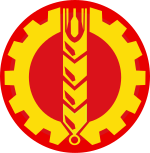Democratic Watan Party of Afghanistan
|
People's Democratic Party of Afghanistan
حزب دموکراتيک خلق افغانستان د افغانستان د خلق دموکراټیک ګوند |
|
|---|---|
 |
|
| Abbreviation | PDPA |
| Founded | 1 January 1965 |
| Dissolved | 16 April 1992 |
| Succeeded by | Watan Party |
| Headquarters | Kabul, Afghanistan |
| Newspaper |
Khalq (1966) Parcham (1969) |
| Youth wing | Democratic Youth Organization of Afghanistan |
| Membership | 160,000 (Late 1980s) |
| Ideology |
Communism Marxism-Leninism |
| Political position | Far-left |
| Colors | Red Yellow |
| Party flag | |
 |
|
The People's Democratic Party of Afghanistan (Persian: حزب دموکراتيک خلق افغانستان, Hezb-e dimūkrātĩk-e khalq-e Afghānistān, Pashto: د افغانستان د خلق دموکراټیک ګوند, Da Afghanistān da khalq dimukrātīk gund; abbreviated PDPA) was a political party established on 1 January 1965. While a minority, the party helped former prime minister of Afghanistan, Mohammed Daoud Khan, to overthrow King Mohammed Zahir Shah in 1973, and establish the Republic of Afghanistan. Daoud would eventually become a strong opponent of the party, firing PDPA politicians from high-ranking jobs in the government cabinet. This would lead to uneasy relations with the Soviet Union.
In 1978 the PDPA, with help from the Afghan National Army, seized power from Daoud in what is known as the Saur Revolution. Before the civilian government was established, Afghan National Army Air Corps colonel Abdul Qadir was the official ruler of Afghanistan for three days, starting from 27 April 1978. Qadir was eventually replaced by Nur Muhammad Taraki. After the Saur Revolution, the PDPA established the Democratic Republic of Afghanistan which would last until 1987. After National Reconciliation talks in 1987 the official name of the country was reverted to Republic of Afghanistan (as it was known prior to the PDPA coup of 1978). Under the leadership of Najibullah in 1990, the party's name was changed to Homeland Party (حزب وطن, Hezb-e Watan). The republic lasted until 1992 as the mujahideen rebels took over. The PDPA dissolved, with some officials joining the new government, some joining militias, whilst others deserted. Pro-Najibists relaunched the Hezb-e Watan in 2004 and again in 2017.
...
Wikipedia
